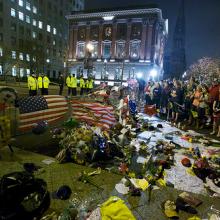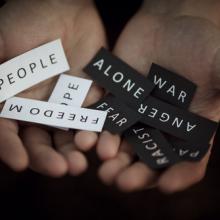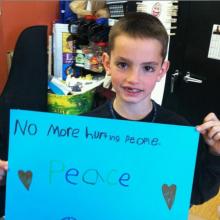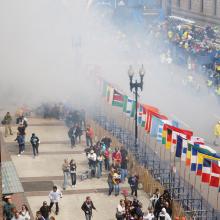boston bombing
His guilt is clear. He posted offensive, arrogant messages all over the Internet. He carved a manifesto of revenge into the boat where he hid as police captured him. He flipped a bird at the camera in his jail cell.
The evil he is responsible for is horrific. More than 250 people injured. Seventeen people lost their limbs. Four people died — one of them 8 years old.
It’s no surprise that a jury found him guilty, and still no surprise that they sentenced him to death.
What’s remarkable is the lack of enthusiasm that accompanied Tsarnaev’s death sentence. One person after another had mercy on their lips – from victims of the Boston bombing to the legendary Sr. Helen Prejean who met with Dzhokhar and spoke of his heartfelt remorse.
An undisclosed community on Wednesday accepted the body of Boston bombing suspect Tamerlan Tsarnaev, which is now “entombed,” according to police in Worcester, Mass.
Tsarnaev’s uncle, Ruslan Tsarni, found a funeral home in Worcester to handle the body, but had struggled to get a cemetery to accept it. The Boston Globe reported that the body is buried in a community outside Massachusetts.
“As a result of our public appeal for help, a courageous and compassionate individual came forward to provide the assistance needed to properly bury the deceased,” read a statement posted on the Worcester Police Department’s website.
Soon after the Boston Marathon bombings, local Christian leaders stepped swiftly into the public eye, convening vigils and urging peaceful healing in the wake of senseless violence.
But their public voices have fallen mostly silent as noisy resistance grows to the prospect that suspected bomber Tamerlan Tsarnaev could be buried in local soil.
Cemeteries and even some mosques have refused to take his body. His city, Cambridge, has urged family members to bury him elsewhere. Republican U.S. Senate candidate Gabriel Gomez and local talk radio host Dan Rae want him dumped in the ocean, like Osama bin Laden. Clergy have largely kept mum.
“The only signs of people who are showing some sort of moral conscience are those few who stand with a card near the funeral home saying [burial] is a corporal work of mercy,” said James Keenan, a moral theologian at Boston College. “To say, ‘we won’t bury him’ makes us barbaric. It takes away mercy, the trademark of Christians. … I’m talking about this because somebody should.”
When I got off the plane at O’Hare Airport in Chicago on my way home to Boston on April 15, I couldn’t believe my eyes. Televisions blaring everywhere showed my beloved city at her premier event of the year, the Boston Marathon. Everyone knows the rest of the story.
“Is this for real? How can this be?” I asked, unable at first to face the reality of what had occurred. Feelings of fear and anger followed quickly on the heels of the denial.
Leaders responded quickly: the mayor, the governor, the president. “Any responsible individuals, any responsible groups will feel the full weight of justice,” promised President Barack Obama.
What is justice? Vengeful words immediately spewed from talk shows and bloggers’ keyboards. “We must catch them alive and make them suffer as much as possible. That will pay them back for what they did,” spewed those who equate justice with revenge.
Of course, violence begets more violence. Gandhi put it succinctly: “An eye for an eye makes the whole world blind.” Paul exhorted the Romans, “Repay no one evil for evil, but take thought for what is noble in the sight of all. . . Beloved, never avenge yourselves, but leave it to God, for it is written, ‘Vengeance is mine, I will repay,’ says the Lord. (Romans 12:17,19.)”
Five men who know what it means to be president of the United States shared a stage in University Park, Texas. Then the incumbent among them flew to Waco, to mourn 11 first-responders, killed in a fertilizer plant explosion in the small town of West, Texas.
All presidents try to rewrite history to burnish their brief place in it. And in his new presidential library, George W. Bush will have his turn.
Barack Obama’s legacy is still a work in progress, though even sympathetic commentators are seeing him now, in his fifth year, as too slow to act, too cerebral to brawl, and too little respected by his political enemies.
In one role, however, Obama has excelled: “Mourner in Chief” — not one of his constitutional duties but oddly important.
Here in the Upper Midwest (I live in Minnesota), the importance of higher ground is not just metaphorical, as snowmelt-fed flood waters rise to envelope communities. People, quite literally, are forced to higher ground by floods.
It is interesting, too, what happens when that higher ground, the literal higher ground, is sought. Necessarily, there are more people in a smaller area; that’s the nature of it. Diverse groups are forced together. We know these images from the news: the floating cars, and then the displaced people together in a school gym, talking. The power of that second image is that it shows an unexpected, shared space. People have grabbed what they could and fled to this place, often by walking uphill, and now they find themselves together.
When the metaphorical waters rise and destroy what we know or count on, people do the same thing, but that higher ground is a broad mutual faith that encompasses the belief that there is something greater than ourselves, that there must be a reason for these tragedies; we turn to God. Recently, we have seen this happen in Boston and in West, Texas. At the memorial for the victims of the explosion in West, held at Baylor University, President Barack Obama spoke openly about faith.
In the wake of the Boston Marathon bombings that left three dead and more than 260 injured, perhaps none face more significant adjustments or a longer road ahead than the 14 amputees who lost a limb.
For these victims, the path forward involves relearning almost everything, from getting out of bed to getting in a car. Whether they go on to lead satisfying lives depends largely on how they handle the spiritual challenges at hand, according to amputees and researchers.
Losing a limb is like losing a family member: It involves grief and mourning, according to Jack Richmond, a Chattanooga, Tenn., amputee who leads education efforts for the Manassas, Va.-based Amputee Coalition. When one’s body and abilities are radically changed, questions of meaning are suddenly urgent: Why did this happen? Why am I here?
“You’re wondering: Why did I live?” said Rose Bissonnette, an amputee and founder of the Lancaster, Mass.-based New England Amputee Association, a support organization for amputees.
Editor’s Note: Jim Wallis’ latest book On God’s Side: What Religion Forgets and Politics Hasn’t Learned About Serving the Common Good is sparking a national conversation on what it means to come together on issues that traditionally divide the nation. Bloggers Adam Ericksen and Tripp Hudgins are having that conversation here, on the God’s Politics blog. Follow along, and join the discussion in the comments section.
What if we surprised our enemies?
I mean, really surprised them. What if we surprised them with something totally unexpected? When our personal, political, and national enemies strike us, they expect us to strike back. That’s been the human script since the foundations of human culture. We mimic violence blow for blow. Only each side wants to be the side who delivers the final blow.
What if we surprised our enemies and changed the script?
I wonder if social isolation — not extremist religion or Chechen roots — explains the two brothers who set off bombs during the Boston Marathon, killing three and wounding more than 170.
The older brother, Tamerlan Tsarnaev, was quoted as saying “I don’t have a single American friend, I don’t understand them.” One emerging theory is that, he dealt with isolation in America by seeking his heritage in Chechnya and there, some think, found purpose in violence against his unwelcoming home.
In feeling isolated, the alleged bomber isn’t alone. Isolation is the new normal in America.
CAMBRIDGE, Mass. — After two troubling outbursts at a local mosque, leaders there told Boston Marathon bombing suspect Tamerlan Tsarnaev he would no longer be welcome if he continued disrupting services.
Leaders at the Islamic Society of Boston‘s mosque in Cambridge say Tsarnaev, 26, who died early Friday after a shootout with police, “disagreed with the moderate American-Islamic theology” of the mosque, but they never had “any hint” the brothers might be violent.
On one occasion in November at weekly prayer, Tsarnaev challenged an imam who said in his sermon that it was appropriate to celebrate U.S. national holidays, such as July 4th and Thanksgiving, the statement said.
Tsarnaev argued that such celebrations are “not allowed in the faith.” When the preacher met with Tsarnaev after the prayer, Tsarnaev “repeatedly argued his viewpoint, and then left,” the statement said.
Last week was on in which what God envisions for our world seemed so very, very far away.
We watched in horror last Monday as two bombs exploded at the finish line of the Boston Marathon. We wept as we heard about the death of an 8-year-old boy, a 23-year-old grad student, a 29-year-old restaurant manager. We shuddered as we thought about the 170 people injured in the bombings, many of them losing feet or legs. We asked why. Why did this happen? How could human beings do this to others?
Tuesday, we learned about poisoned letters being sent to elected officials. Real poison, not just the poisonous words that are so much of our political dialogue. Is this really what God envisioned for us?
It’s one of the deepest and most enduring themes of the Bible; from Cain and Abel, Isaac and Ishmael, Esau and Jacob, and many more — the two sons, with jealousy, strife, and even murder between them, and almost always, the younger brother takes the glory – or the blame – for the acts of the older brother.
We see it again in the Boston Marathon bombings – the elder brother portrayed as cynical and brutish, while the younger brother, taking the blame, is shown as charming and innocent.
American Muslim leaders said they stand against terrorism committed in the name of Islam, trying to distance themselves from the suspects in the Boston Marathon bombings who were identified as Muslims with ties to Chechnya.
“We will never allow ourselves to be hijacked by this attempt, and we will not allow the perception to be that there is any religion in the world that condones the taking of innocent life,” said Nihad Awad, national executive director of the Council on American-Islamic Relations.
As the manhunt intensified in and around Boston, Muslim leaders convened a press conference Friday to denounce the attacks and to urge the media not to link their faith with violent extremism.
Two days after the Boston Marathon bombings, Boston Medical Center chaplain Sister Maryanne Ruzzo was checking on staffers who’d been caring for the injured when she received a page. A bombing victim wanted to see her.
The bedside was fraught with worry. A woman in her 30s had lost a leg to amputation as surgeons deemed it unsalvageable. Still suffering multiple injuries, she was now heading into surgery again, knowing she might wake up with no legs at all.
Ruzzo stood among the woman’s parents and siblings and did what she does best: listen. She heard their fears, including concern for the woman’s husband, who was being treated at a different hospital and who also might lose a leg to amputation. Then she prayed.
“Other people might not want to feel the pain and say, ‘Oh, it’s going to be fine,’” said Ruzzo, the Archdiocese of Boston’s coordinator of Catholic services at BMC. “We just try to be present and listen to them. … I prayed for the surgeons and the nurses.”
In a week when Boston hospitals cared for more than 170 bomb victims, staff chaplains were suddenly in great demand. They moved calmly from emergency departments to waiting rooms and employee lounges, offering a compassionate ear and much-needed comfort to anxious patients, family members and staffers.
Life is difficult. It can knock you down. Sometimes, an entire nation gets knocked down.
First it was Boston. Some mad man (or men) lays waste to one of America’s most hallowed sporting events — the Boston Marathon. Sidewalks that should have been covered with confetti were covered in blood.
Then it was the quintessential small Texas town of West. Populated by hearty Czech immigrants, folks in West worked hard in their shops, bakeries, and fertilizer plant until the plant exploded. A magnitude-2.1 on the Richter scale, witnesses compared it to a nuclear bomb. Dozens are feared dead.
In the nation’s capital, we had the bitter realization that something is broken that will not be easily repaired. A commonsense proposal that emerged from the Newtown, Conn., tragedy, background checks to prevent convicted felons and the seriously mentally ill from purchasing guns online or at gun shows, fell prey to Washington gridlock. None of the Newtown proposals — the ban on assault weapons, limits on the number of bullets a gun can hold or expanded background checks — could garner the 60 votes necessary to overcome a Senate filibuster.
Finally, there were the ricin-laced letters sent to a Republican senator and the president.
I woke up this morning, like everyone else, to the news of a shootout with one suspect in the Boston Marathon bombing and the ongoing manhunt for a second brother. Like many others, I’ve heard lots of misinformation over the past few days about whether officials did or didn’t have a suspect, whether they did or didn’t have them in custody, and so on.
“I heard someone dropped a bomb on Boston,” said Mattias, my 9-year-old son, over breakfast while I scrolled through the breaking news reports.
“Not exactly,” I said. “It was two guys. Two brothers who came from [another country] to go to college at MIT.” They put homemade bombs in and around trashcans by the finish line of the marathon.”
“Why?” he asked.
“I really don’t know.”
“Maybe they were angry about something, and they didn’t know how to talk about their feelings.”
“Maybe so,” I nodded.
“Did they hurt people?”
I hear it over and over again both during my conversations on the road, and as I skim the headlines each day, that we are in a battle for the common good.
I learned about the Boston bombings as my plane landed in Portland, Ore., traveling for an 18-city book tour to spark a conversation on “the common good.” As I read and watched more about the tragedy, there unfolded such a stark and brutal contrast between the explicit intent to kill, hurt, and maim others, and the actions of those who rushed toward the blast, risking their own lives to help the wounded. One act of vicious violence was aimed to destroy the common good and create a society based on fear. The others displayed the highest commitment to redeem the common good and insist that we will not become a nation based on fear, but on mutual service and support.
When real or imagined grievances combine with rage, religious fundamentalism, political extremism, mental illness, or emotional instability, we lose the common good to dangerous violence, fear, and deep distrust in the social environment. But when grievances lead to civil discourse, moral engagement, and even love and forgiveness, different outcomes are possible.
The Boston Marathon bombing is so shocking because it was obviously done by someone(s) who wanted to prove something not to themselves, but to others. Could they display to the world his repressed rage enough? Could they divert attention to their cause enough? Could they maim and kill the innocent for some misguided agenda enough? That is what makes this act of terrorism so terrifying: a sick person or people trying to prove something to others by targeting those who are simply proving something to themselves, or trying to do something for others. It is jarring.
Ninety minutes before the bombs detonated, I was concluding a presentation on Jesus’ parable of the Good Samaritan. That recent immersion into Luke’s narrative shaped my video viewing of the bombing’s aftermath. The one who “fell into the hands of robbers” was everywhere. The assaulted and bloodied were scattered by the side of the road, in this case, Boylston Street. Instead of people passing by on the other side, however, it was quite the opposite. Spectators and emergency medical personnel waded into the grisly scene and treated the wounded with exquisite care.
What do you say in the face of evil?
The stories from Monday’s attacks at the Boston Marathon are heartbreaking, gut-wrenching. One in particular stands out to me. A woman was waiting for her husband to cross the finish line when the bombs exploded. For three hours she searched frantically for him, not knowing if he was alive or dead, not knowing if he was frantic and looking for her. Her voice cracked and tears flowed with the raw memory as she told of the moment when she and her husband embraced.
Moments like this, even when they end happily, remind us of our vulnerability. As hard as we try to protect ourselves with heightened security measures, we know that complete invulnerability is impossible. I am vulnerable. My wife is vulnerable. My children are vulnerable. We cannot escape it.
In the face of gun violence and bombings, gender violence and rape, we would be irresponsible not to ask big questions about evil and human vulnerability.
A few hours after the bombing, President Barack Obama addressed our natural desire to carry out justice after these events.
[M]ake no mistake; we will get to the bottom of this. We will find out who did this, we will find out why they did this. Any responsible individuals, any responsible groups, will feel the full weight of justice.
Like the president, I want to take action against evil and I want to know I am secure. I hate admitting that I’m vulnerable. But the president’s words didn’t reassure me. They made me feel more vulnerable because the phrase “full weight of justice” is always a veiled call to violence.
I am tormented by what took place at the Boston Marathon. An iconic event that is supposed to be a celebration of achievement and companionship will be scarred with memories of injury and death for years to come. However, the source of my distress is not only the horrific sights and sounds of violence and terror, but in such dreadful disasters I also struggle with our common conceptions of a loving God. As many wonder where God was in the midst of such tragedy, and while others question why God did not (or could not) prevent such terror from taking place, I am personally tormented with my belief of where God's love will be placed in its aftermath.
On the one hand, we are told “blessed are those who mourn, for they will be comforted” (Matthew 5: 4), and in receiving the Gospel in such ways, we take comfort in the belief that God is with those who suffer and directly at the side of those who struggle. This conception of a loving God offers relief for the victims in Boston and all those on the receiving end of transgression. However, while we proclaim a God in solidarity alongside those in pain, we are also often told that God is present with those who cause the pain, for the love and forgiveness found in Jesus is inclusive, it has no boundaries, and nothing is able to “separate us from the love of God in Christ Jesus our Lord” (Romans 8:38-39). So just as Jesus was sent to soothe those who suffer, he also absolves those responsible for the suffering. As a result, we are left with a God who seems to love both saints and sinners, which means we are both comforted and confronted in the aftermath of tragedy in Boston.


















